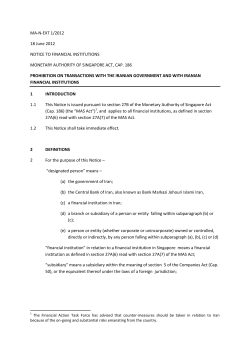
Institute of Chartered Accountants of India Bangalore branch
Institute of Chartered Accountants of India Bangalore branch How to read a Tax treaty and What to look out for in a DTA 30th August, 2008 Naresh Ajwani Rashmin Sanghvi & Associates Chartered Accountants DTA – Its nature • A DTA is a negotiated agreement between two countries. • Each DTA has to be looked at independently. • A DTA seeks to eliminate juridical double tax; distributes rights of taxation; helps in curbing abuse, exchange of information and limited dispute resolution. 1 DTA and Domestic law • Domestic law takes into account the domestic situation. DTA cannot take into account domestic situations of countries involved. • The DTA uses a liberal language compared to a domestic law language. Domestic law is much more specific and exact. 2 DTA and Domestic Law • A DTA does not lay down computation provisions. It does not lay down the manner in which tax can be collected - Advance Tax, withholding tax, etc. • The domestic law can prescribe the manner of computation, grant exemption, disallow expenses, charge any rate of tax – as long as the tax does not exceed that permitted by the DTA. 3 Interpretation of DTA • DTA is an International treaty between two nations. • Interpretation is guided by Vienna Convention. • There is a largely agreed international tax language, and international understanding. • Principles of interpretation of domestic law and international law are different. The difference causes difficulties. 4 DTA operation • The domestic law continues to apply to the taxation of persons. • The country of residence always has the right to tax. However, the country of residence has the responsibility to eliminate double tax. • A DTA does not create a taxing right. It only restricts the taxation rights of a country (normally the source country). 5 DTA operation • The restriction may be: - Full (e.g. Capital Gains cannot be taxed in India as per India-Mu. DTA); - Conditional (e.g. Business income can be taxed only if there is a PE); - Partial (e.g. Royalty can be taxed upto a certain extent); or - There may be no restriction at all (e.g. income from immovable property). 6 Double Taxation - different kinds • Economic double taxation – same income is taxed twice in two persons’ hands. DTA does not eliminate this double taxation. • Juridical double taxation – income is taxed in one person’s hands in two different jurisdictions. DTA seeks to eliminate this double taxation. 7 Double Taxation - different kinds • Dual residence – Both countries may seek to tax the person on global income basis. DTA allocates residence to one country with tiebreaking rules. • Dual source – the income may be considered as sourced in both countries. DTA does not eliminate this double taxation. 8 DTA applicability • For DTA to apply, two basic conditions should be fulfilled: - The claimant should be a person under the tax laws and the DTA. - The person should be a resident of one or both the countries. 9 Permanent Establishment • Four kinds of PEs: - Fixed place PE. - Construction PE. - Agency PE. - Service PE. • Examples of PE as per article 5(2) are not PEs if they do not satisfy the fixed place test under article 5(1) – OECD and UN models. However Indian DTAs do not recognise this. 10 Permanent Establishment • India-UK DTA: Construction PE: 5(2) The term "permanent establishment" shall include especially: (j) - a building site ………..... or supervisory activity in connection therewith continues > 6 months. or - supervisory activity incidental to sale of machinery or equipment < 6 months, & charges payable for supervisory activity exceed 10% of sale price of machinery or equipment. 11 Permanent Establishment Protocol: (a) …………… for the purpose of determining whether a building site has continued for a period of more than six months, the Contracting States shall: (i) take no account of time previously spent by employees of the enterprise on other sites or projects which have no connection with the site or project in question; 12 Permanent Establishment (ii) apply the more than six months test to each site or project which has no connection with any other site or project and to each group of connected sites or projects; and (iii) regard a building site as a single site, even if several contracts have been entered into for the work being done, provided that it forms a coherent whole commercially and geographically; 13 Permanent Establishment • What is the meaning of “Coherent whole commercially and geographically”? OECD Commentary on PE – Paras 5.4 to 5.4 - Should be one commercial unit – e.g. Mine, Market place, Road construction project. - Should have geographical coherence e.g. Different branches in different locations are different geographical units. Therefore different branches are not coherent whole. 14 Permanent Establishment Service PE: (k) the furnishing of services …………., other than those taxable under article 13 (Royalties and FTs), within India by an enterprise through employees or other personnel, but only if: (i) activities ……. continue > 90 days within any twelve-month period; or (ii) services are performed …… for an Associated enterprise > 30 days within any twelve- month period. 15 Permanent Establishment Provided that for the purposes of this paragraph an enterprise shall be deemed to have a permanent establishment in India and to carry on business through that permanent establishment if it - provides services or facilities in connection with, or supplies plant and machinery on hire used or to be used in, the prospecting for, or extraction or production of, mineral oils in India. • Thus providing service even for a single day in mineral oil sector will amount to a PE. 16 Business Profits • India-UK DTA: Direct and Indirect attribution of profits: Basic Rule – No PE, No attribution, No tax: 7(1) ................, the profits of the enterprise may be taxed in India but only so much of them as is directly or indirectly attributable to that permanent establishment. 17 Business Profits Direct attribution of profits: 7(2) ………….. the profits which that permanent establishment might be expected to make if it were a distinct and separate enterprise …………… shall be treated for the purposes of paragraph (1) of this Article as being the profits directly attributable to that permanent establishment. 18 Business Profits Indirect attribution of profits: 7(3) Where a permanent establishment takes an active part in negotiating, concluding or fulfilling contracts entered into by the enterprise, then, notwithstanding that other parts of the enterprise have also participated in those transactions, that proportion of profits of the enterprise arising out of those contracts which the contribution of the permanent establishment to those transactions bears to that of the enterprise as a whole shall be treated for the purposes of paragraph (1) of this Article as being the profits indirectly attributable to that permanent establishment. 19 Business Profits Protocol: (b) that, in applying paragraph (3) of Article 7, for the purpose of determining whether a permanent establishment has taken an active part in negotiating, concluding or fulfilling contracts entered into by the enterprise, the Contracting States shall take into consideration all relevant circumstances and, in particular, the fact that a contract or order relating to the purchase or provision of goods or services was negotiated or placed with the head office of the enterprise, rather than with the permanent establishment, shall not preclude them from determining that the permanent establishment did take an active part in negotiating, concluding or fulfilling that contract; 20 Business Profits 7(7) Paragraph (5) (Deduction for expenses) shall not apply to amounts paid (otherwise than towards reimbursement of actual expenses) by the P.E. to H.O. or any of its other offices, by way of royalties, fees or other similar payments, or by way of commission, for specific services performed or for management, or, except in the case of a banking enterprise, by way of interest on monies lent to the permanent establishment; nor shall similar incomes of P.E. from H.O. be taken into account. Interest in case of banks shall be considered. 21 Business Profits • ABN Amro (280 ITR 117) – Interest is not disallowable under the DTA. It doesn’t mean it is allowable under the Income-tax Act. • CBDT circular 740 of 1996. • Dresdner Bank (108 ITD 375) – Interest earned by PE is taxable. 22 Force of Attraction • India – Italy DTA: 7(1) The profits of an enterprise Italy shall be taxable only in that State unless the enterprise carries on business in India though a permanent establishment situated therein. If the enterprise carries on business as aforesaid, the profits of the enterprise may be taxed in India but only so much of them as is attributable to (a) that permanent establishment; 23 Force of Attraction (b) sales in that other State of goods or merchandise of the same or similar kind as those sold through that permanent establishment; or (c) other business activities carried on in that other State of the same or similar kind as those effected through that permanent establishment. 24 Force of Attraction • FOA clause is for taxing income which can be earned by doing business from HO instead of PE. • Goods of “same or similar kind” can lead to litigation. 25 Force of Attraction Italian Company Italian Company P.E. in India sells computers Sells printers in India directly Are computers & printers similar? 26 Force of Attraction Canadian Co. Project office P.E. does installation of machinery Sale of machinery direct from H.O. Roxon (10 SOT 454) – FOA clause cannot apply due to installation services. 27 Force of Attraction Activity U.S.Co. % of profits purchases raw material 20% manufacturers goods markets & sells the goods other business activities 20% 30% 30% P.E. in India markets & sells the goods. Sells goods directly in India. How much profits can be attributed to India in case of H.O. – only marketing & selling, or even manufacturing? 28 Associated Enterprises • India-UK DTA: Corresponding adjustment: 10(2) Where U.K. taxes profits of an enterprise of U.K. due to application of Transfer Pricing rules, which have been taxed in the hands of Indian enterprise in India, then India shall make an appropriate adjustment to the amount of the tax charged therein on those profits. • All DTAs do not have corresponding adjustments DTA). this clause for (E.g. Singapore 29 Associated Enterprises Corresponding adjustment: Original income Adjustment by U.K. Corresponding adjustment by India U.K. India Total 10,000 + 1,000 3,000 -- 13,000 +1,000 --1,000 -1,000 ---------- --------- -------11,000 2,000 13,000 30 Associated Enterprises Adjustment by India to U.K. company’s income: Indian Company pays interest to U.K. Co. Original income Adjustment by India to U.K. Co’s income (Disallowance of interest) U.K.Co. Indian Co. Total in India 2,000 3,000 5,000 ---------2,000 1,000 --------4,000 1,000 -------6,000 Is India required to adjust Indian company’s income? No. Is U.K. required to adjust U.K. company’s income? No. There can be double tax. 31 Capital Gain • India-UK DTA: 14. Except as provided in Article 8 (Air transport) and 9 (Shipping) of this Convention, each Country-India/U.K. may tax capital gains in accordance with the provisions of its domestic law. • Both countries can tax the income. The other DTA with similar clause is India-USA. 32 Capital Gain • India–Netherlands DTA: 13(5) Gains from the alienation of any property other than that referred to in paragraphs 1, 2, 3 and 4, shall be taxable only in Netherlands of which the alienator is a resident. However, gains from the alienation of shares of Indian company which shares form part of at least a 10 per cent interest in the capital stock of Indian company, may be taxed in India if the alienation takes place to a resident of India. 33 Capital Gain However such gains shall remain taxable only in Netherlands of which the alienator is a resident if such gains are realized in the course of a corporate organization, reorganization, amalgamation, division or similar transaction, and the buyer or the seller owns at least 10 per cent of the capital of the other. 34 Capital Gain • Thus Capital Gain is not taxable on: - Re-organisation etc. - Sale by Netherlands resident to a non-resident of India. - Sale to an Indian resident if the holding is less than 10%. 35 Capital Gain • Capital Gain is taxable only if sale is to an Indian resident and the holding is 10% or more. • In Netherlands, Capital Gain is exempt due to participation exemption. 36 Capital Gain • India – Mauritius DTA: 13(4) Gains derived by a resident of Mauritius from the alienation of any property other than those mentioned in paragraphs 1, 2 and 3 of this Article shall be taxable only Mauritius. 37 Capital Gain • India – U.A.E. DTA: Pre–Protocol: 13(3) Gains from the alienation of any property other than that mentioned in paragraphs 1 and 2 shall be taxable only UAE of which the alienator is a resident. Post-Protocol: 13(4) Gains from the alienation of shares other than those mentioned in paragraph 3 in a company which is a resident of India may be taxed in India. • Gains from other securities is not taxable in India. 38 Capital Gain • India – Singapore DTA: (4) “Gains derived by a resident of Singapore from the alienation of any property other than those mentioned in paragraphs 1, 2 and 3 of this Article shall be taxable only in Singapore.” 39 Capital Gain • Limitation of Benefits: Article 3 of protocol dated 29th June 2005: (1) A resident of Singapore shall not be entitled to the benefits of Article 1 of this Protocol if its affairs were arranged with the primary purpose to take advantage of the benefits in Article 1 of this Protocol. (2) A shell/conduit company that claims it is a resident of Singapore shall not be entitled to the benefits of Article 1 of this Protocol. A shell/conduit company is any legal entity falling within the definition of resident with negligible or nil business operations or with no real and continuous business activities carried out in Singapore. • LOB clause applies only to article 13(4). 40 Capital Gain (3) A resident of Singapore is deemed to be a shell/conduit company if its total annual expenditure on operations in Singapore is less than S$200,000 or Indian Rs 50,00,000 in the respective Contracting State (Singapore) as the case may be, in the immediately preceding period of 24 months from the date the gains arise. • Does this mean that if Singapore company spends Rs. 50 lakhs / S$ 2 lakhs, it is entitled to the benefit under article 13(4), or Can article 3(1) of the protocol still apply independently? 41 Capital Gain (4) A resident of Singapore is deemed not to be a shell/conduit company if: (a) it is listed on a recognised stock exchange of Singapore; or (b) its total annual expenditure on operations in Singapore is equal to or more than S$200,000 or Indian Rs 50,00,000 in the respective Contracting State (Singapore) as the case may be, in the immediately preceding period of 24 months from the date the gains arise. 42 Capital Gain (Explanation: The cases of legal entities not having bonafide business activities shall be covered by Article 3.1 of this Protocol.) 43 Capital Gain Footnote to article 3 of protocol: (1) The term “annual expenditure” means an expenditure incurred during a period of 12 months. The period of 24 months shall be calculated by referring to two blocks of 12 months immediately preceding the date when the gains arise. • The company must exist in Singapore for at least 2 years and spend Rs. 50L / S$ 2L each year, before it can take advantage of the DTA. • What is the meaning of expenditure on “operations in Singapore”? 44 Capital Gain (2) Recognised Stock Exchange refers toa) in the case of Singapore, the securities market operated by the Singapore Exchange Limited, Singapore Exchange Securities Trading Limited and the Central Depositary (Pte) Limited; and b) in the case of India, a stock exchange recognised by the Securities and Exchange Board of India. 45 Capital Gain Article 6 of protocol dated 29th June 2005: Articles 1, 2, 3 and 5 of this Protocol shall remain in force so long as any Convention or Agreement for the Avoidance of Double Taxation between the Government of the Republic of India and the Government of Mauritius provides that any gains from the alienation of shares in any company which is a resident of Mauritius shall be taxable only in Mauritius in which the alienator is a resident. • This is a limitation on LOB clause. 46 Foreign Tax Credit • India – U.K. DTA: 24(1) Subject to the provisions of the law of the United Kingdom ……….. (a) Indian tax payable under the laws of India and in accordance with the provisions of this Convention, ................... shall be allowed as a credit against any United Kingdom tax ………………... (Direct Tax Credit) 47 Foreign Tax Credit (b) In the case of a dividend paid by a company which is a resident of India to a company which is a resident of the United Kingdom and which controls directly or indirectly at least 10 per cent of the voting power in the company paying the dividend, the credit shall take into account (in addition to any Indian tax for which credit may be allowed under the provisions of sub- paragraph (a) of this paragraph) the Indian tax payable by the company in respect of the profits out of which such dividend is paid. (Underlying Tax Credit) 48 Foreign Tax Credit 24(3) Subject to paragraph (5) of this Article, for the purposes of paragraph (1) of this Article the term "Indian tax payable" shall be deemed to include: (a) any amount which would have been payable as Indian tax but for a deduction allowed in computing the taxable income or an exemption or reduction of tax granted for that year in question under the provisions of the Income-tax Act 1961 (43 of 1961) referred to in paragraph (4)(a) or (b) of this Article; (Tax Sparing) 49 Foreign Tax Credit 24(4) The provisions referred to in this paragraph are: (a) sections 10(4), 10(4B), 10(6)(viia), 10(15)(iv), 33AB, 80HHD, 80I and 80IA; (b) any other provision which may subsequently be enacted granting an exemption or reduction from tax which is agreed by the competent authorities of the Contracting States to be of a substantially similar character to a provision referred to in sub-paragraph (a) of this paragraph, if it has not been modified thereafter or has been modified only in minor respects so as not to affect its general character; (c) sections 10A and 10B. 50 Taxes Covered under DTA • Article 2 – deals with taxes covered by the DTA. • Nature of tax should be income-tax. • Income-tax levied in any form by any authority is eligible for DTA relief. • In some countries, only Federal Tax is eligible e.g. U.S.A. 51 Dividend Distribution Tax (DDT) • Can credit be available for DDT as: - Direct Credit. - UTC. • Is DDT tax on income? • Can we consider that DDT has been paid by earner of income? • Is it necessary that income earner should pay the tax? 52 Dividend Distribution Tax (DDT) • S.115-O – Dividends shall be charged to additional income-tax. S.115-O(2) fixes the liability on the company. Thus company pays income-tax +DDT. This is a COR issue. • Can DDT be considered as a part of UTC? 53 Dividend Distribution Tax (DDT) • U.K. & Mauritius have clarified that they will give credit for DDT. • Can DDT be restricted to DTA rate? India-U.K. DTA- Article 11(2) – • Can an Advance Ruling be obtained? S.245N(a)(i) – Does the non-resident bear the tax? S.245N(a)(ii) – Is it a tax liability of the nonresident? 54 Fringe Benefits Tax • Is it a tax covered under the DTA? • Whose tax is being paid – Employer or Employee? • Who will get the credit – Employer or Employee? [Employee may be taxed in his home country. In India, employer will pay FBT.] 55 Fringe Benefits Tax • For the employer, can we say, it is tax on income, or is it a tax on expenditure? [Even if there is a loss, FBT may be payable.] • FBT may be payable without having a PE. There may be no income taxable in India, yet FBT is paid. Will it be available as credit? • It is a COR issue. 56 Education Cess • Cess means a tax for specific purpose. When levied as increment to an existing tax, the name matters not for the validity of the cess must be judged of in the same way as the validity of the tax to which it is increment. (Chaturvedi & Pithisaria, fifth edition, Page 2377.) 57 Education Cess E.C. after E.C. before FTC FTC Tax in India on Foreign Income I. Less: Foreign Tax 300 - 200 100 Add: Education Cess @ 3%. 3 II. Less: Foreign Tax Tax in India 103 300 9 309 200 109 58 Education Cess E.C. is not E.C. is part a part of I.Tax of I.Tax Tax in India on Foreign Income Add: Education Cess Total Tax 300 9 309 300 9 309 Foreign Tax – 400 Restricted to Net Tax in India 300 9 309 59 Foreign Tax Credit • India does not have any Underlying Tax Credit (UTC). provisions for • Under Singapore & Mauritius DTAs, India is required to allow UTC. 60 Foreign Tax Credit • India – Singapore DTA: 25(2) ……….. Where the income is a dividend paid by a company which is a resident of Singapore to a company which is a resident of India and which owns directly or indirectly not less than 25 per cent of the share capital of the company paying the dividend, the deduction shall take into account the Singapore tax paid in respect of the profits out of which the dividend is paid. (Underlying Tax Credit) • Singapore provides single level of UTC. 61 Foreign Tax Credit • India Mauritius – DTA: 23(2) (a) …………. (b) In the case of a dividend paid by a company which is a resident of Mauritius to a company which is a resident of India and which owns at least 10 per cent of the shares of the company paying the dividend, the credit shall take into account (in addition to any Mauritius Tax for which credit may be allowed under the provisions of sub-paragraph (a) of this paragraph) the Mauritius tax payable by the company in respect of the profits out of which such dividend is paid. (Underlying Tax Credit) • Mauritius provides multiple levels of UTC. 62 Questions and comments are welcome. Thank you. Naresh Ajwani 63
© Copyright 2025














